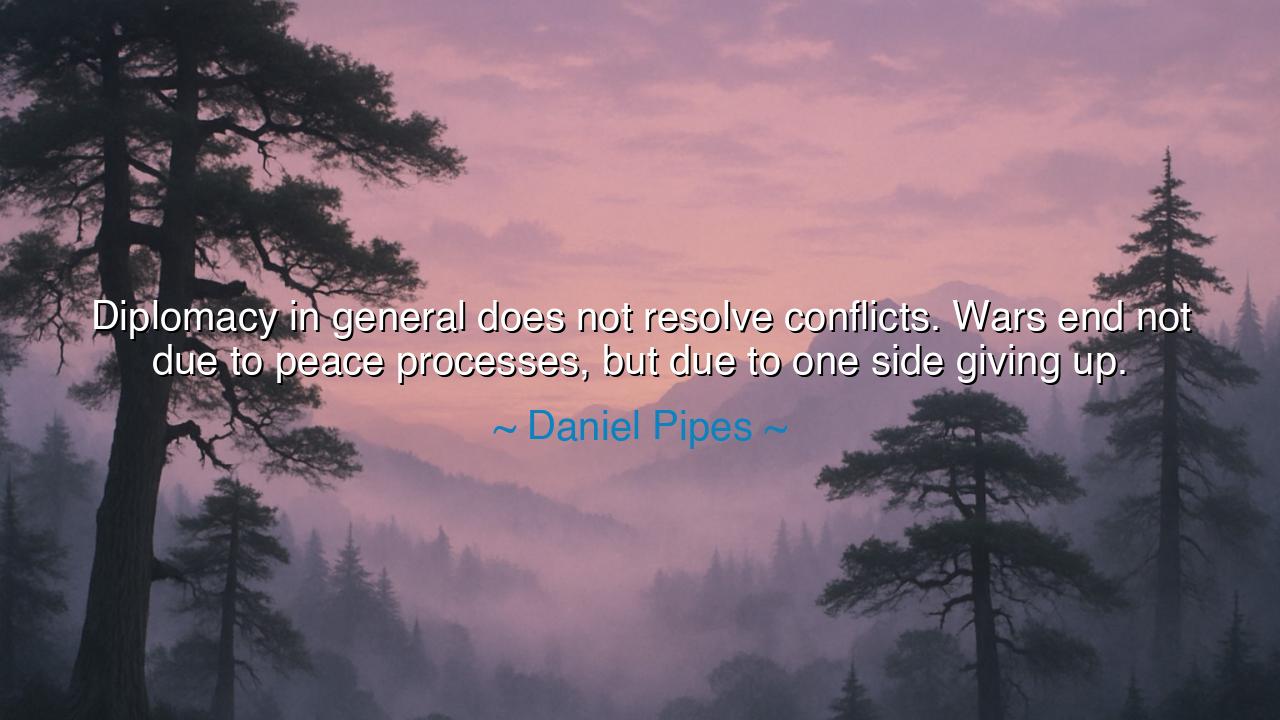
Diplomacy in general does not resolve conflicts. Wars end not
Diplomacy in general does not resolve conflicts. Wars end not due to peace processes, but due to one side giving up.






The words of Daniel Pipes—“Diplomacy in general does not resolve conflicts. Wars end not due to peace processes, but due to one side giving up”—strike the ear with a hard and unsentimental truth. They remind us that beneath the ceremonies of negotiation, beneath the banners of treaties, the end of war is usually born not of mutual harmony, but of exhaustion, collapse, or defeat. Pipes speaks as one who gazes past the ornaments of politics into the marrow of history, where the sword and the will often decide what ink and parchment merely record.
The origin of this thought lies in the long record of human struggle. Across centuries, men have dreamed that reason and dialogue might prevent bloodshed, yet more often than not, wars are concluded not by diplomacy, but by one side bowing to force. Treaties, truces, and peace accords are but the signatures that mark a reality already forged on the battlefield. Pipes does not deny the value of dialogue, but he unmasks its limits, showing that conflict is rarely ended by words alone—it ends when one heart breaks, when one power weakens, when one side can no longer bear the weight of war.
Consider the tale of World War II. For years, the Allies and the Axis powers clashed in a struggle that spanned continents. Could diplomacy have ended it? Many tried before the war began, offering talks, appeasements, and agreements, but such words proved empty. In the end, it was not negotiation that silenced the guns, but the overwhelming defeat of the Axis. Berlin burned, Tokyo lay in ruins, and it was then—only then—that treaties were signed. This was no triumph of dialogue, but of sheer surrender. It was the reality of one side giving up, not a peace process, that ended the bloodshed.
And yet, there are moments when the dream of diplomacy rises again. Men point to accords, summits, and negotiations as signs of progress. But even in these cases, history reveals that such agreements succeed only when they reflect the power already decided by war or pressure. The Camp David Accords between Israel and Egypt, often hailed as a triumph of peace-making, came after Egypt had fought wars it could no longer sustain. It was not the words of the summit that changed the course of history, but the recognition, born of hardship, that Egypt had no choice but to yield.
The meaning of Pipes’ words is not to glorify war, but to unveil its grim mechanics. Peace without victory is fragile, but peace born of surrender is lasting, for it reflects the true balance of power. A war may drag on for years if both sides still believe they can prevail. Only when one side loses hope, strength, or the will to continue, does the killing cease. Thus, his saying warns us: do not be deceived by ceremonies of peace, for they are the shadows of war’s reality, not its replacement.
The lesson for us is sobering: when facing conflict, whether between nations or within our own lives, we must recognize that words alone cannot mend what will is determined to resist. Reconciliation is possible, but only when the heart is ready to yield. In our own disputes, whether with friends, families, or communities, the end often comes when one side humbles itself, choosing peace over pride. Without that surrender, quarrels fester, negotiations collapse, and bitterness continues.
Practically, let us not cling to illusions. In great matters, understand that true peace often requires sacrifice, concession, and humility—whether by nations or by individuals. In small matters, when strife rises, dare to ask: am I willing to be the one who yields, who lays down the arms of pride, who chooses harmony over endless contention? For though Daniel Pipes speaks of wars among nations, the wisdom reaches every heart: conflict ends not when words are spoken, but when someone gives up the battle within themselves.
Thus, his words echo as a hard but necessary wisdom for future generations: “Diplomacy in general does not resolve conflicts. Wars end not due to peace processes, but due to one side giving up.” Learn this truth, not to despair, but to live wisely—knowing that peace comes not from the grandeur of conferences, but from the humbling of pride, whether in kingdoms or in the human soul.






AAdministratorAdministrator
Welcome, honored guests. Please leave a comment, we will respond soon